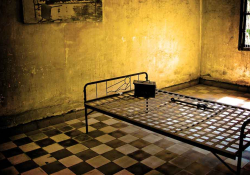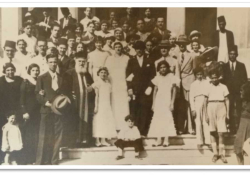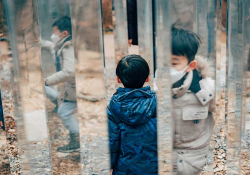Roberto Bolaño’s Tantrums

“Literature was a vast minefield occupied by enemies,” Roberto Bolaño, who enjoyed accruing enemies in the pantheon of Latin American letters, writes in the short story “Meeting with Enrique Lihn” (New Yorker, December 22, 2008):
except for a few classic authors (just a few), and every day I had to walk through that minefield, where any false move could be fatal, with only the poems of Archilochus to guide me. It’s like that for all young writers. There comes a time when you have no support, not even from friends, forget about mentors, and there’s no one to give you a hand; publication, prizes, and grants are reserved for the others, the ones who said “Yes, sir,” over and over, or those who praised the literary mandarins, a never-ending horde distinguished only by their aptitude for discipline and punishment—nothing escapes them and they forgive nothing.
Aptitude for discipline and punishment Bolaño himself had aplenty, too. And in spite of his precarious health, he had stamina. At a young age, he had made up his mind he would die. Who cared if he annoyed others? His mission, as is clear from The Savage Detectives (1998), was to upend that tradition, to take it by the neck and expose its platitudes. What is the use of sacred cows if not to be desecrated? Indeed, every tradition needs an enfant terrible, maybe more than one. When was the last time a rabble-rouser came along in Latin American literature? As Bolaño put it in 2666 (2004), “if you’re going to say what you want to say, you’re going to hear what you don’t want to hear.”
I write these paragraphs in the middle of the Covid-19 pandemic. (Though I really don’t know how to measure the length of the calamity. Might I still be at the beginning?) The whole planet is upside down, taken by the neck. Infectious viruses are rampant. The general feeling if of despair. Death is everywhere at the door. Of course, there is no interest in sacred cows now.
I can’t but imagine how Bolaño would have thrived in this environment, the bile he would have enjoyed spilling. His essay “Literature + Illness = Illness” (The Insufferable Gaucho, 2003) is an insightful meditation into why death should be welcomed, not shunned. He wrote it knowing his prognosis was grim. In it, he talks of Kafka realizing his bouts of tuberculosis will soon draw him flat, when there is nothing between him and eternity. Bolaño dedicated the essay to his friend Dr. Víctor Vargas, a hepatologist who tried fruitlessly to save his life. In the superb Playboy interview (July 2003) with Mónica Maristain, he is asked what he wishes to do before dying. “Nothing special,” Bolaño responded.
Well, clearly I’d prefer not to die. But sooner or later the distinguished lady arrives. The problem is that sometimes she’s neither a lady nor very distinguished, but, as Nicanor Parra says in a poem, she’s a hot wench who will make your teeth chatter no matter how fancy you think you are.
It goes without saying that in death, Bolaño has become a mandarin.
It goes without saying that in death, Bolaño has become a mandarin. That’s the effect death has on enfants terribles: it turns them into myth. He is at the center of the very literary tradition he sought to sabotage. The vast minefield occupied by enemies has been turned into a memorial park, with mausoleums, statues, murals, and other paraphernalia. It is ironic how the subversive has metamorphosed into a Che Guevara–like model among middle-class readers and creative-writing factories, not only in Latin American but everywhere. Yet his scream-and-shout strategy, his mantra of face-Goliath-without-fear remains his alone, since rebellion is not for the faint of heart.
The parade of Bolaño’s tantrums against Latin American icons is plentiful. So is his reverence toward other agitators. At one point in The Savage Detectives, he describes an attempt by his alter ego, Arturo Belano, along with his pal and partner in crime Mario Santiago (aka Ulises Lima), to kidnap Octavio Paz, the Nobel Prize–winning poet and essayist, near Parque Hundido, in Colonia Benito Juárez, not far from Paz’s Mexico City apartment. The endeavor is designed to be another iteration, like those the Infrarrealistas orchestrate in Casa del Lago and other sites, against Mexico’s literary establishment.
In every national culture Bolaño irritatingly inserted himself in—Chile, Argentina, Mexico, and Spain—he made sharp, uncompromising critiques. He ridiculed Diamela Eltit for being impenetrable (she is!) and Isabel Allende for being square and unadventurous (ditto). In Between Parentheses (2011), he affirms, with venomous panache, that she’s nothing if not tacky:
Asked to choose between the frying pan and the fire, I choose Isabel Allende. The glamour of her life as a South American in California, her imitations of García Márquez, her unquestionable courage, the way her writing ranges from the kitsch to the pathetic and reveals her as a kind of Latin American and politically correct version of the author of The Valley of the Dolls …
Blah blah blah. Bolaño scorns Paolo Coelho (“a soap opera Rio with doctor”). He poked fun of Mario Vargas Llosa for jogging his way to success (he meditates on two of the Peruvian’s novels in Between Parenthesis [2011]) and teased Carlos Fuentes for fashioning himself as a prima donna (César Aira also licked his fingers on this idea, turning it into a novella). And this doesn’t include the Latin American authors he snubbed by not even acknowledging their existence: José Donoso, Laura Esquivel, Ariel Dorfman, etc.
Schadenfreude, a useful German term, implies the joy that results from the troubles of others. Bolaño not only loved trouble; he also knew his invectives were a spectacle. The world is too complacent, with too many people getting accolades with little effort. He learned the tricks from fellow Chilean Nicanor Parra, a physicist and poet whose oeuvre is an equal rat-a-tat against all sorts of targets, not only literary: the hypocrisy of the bourgeoisie, the guilt of the Catholic Church in the decimation of Indigenous peoples and its closeness to power since the colonial period; the tendency of the rest of the world to see Latin America as exotic; Neruda’s myopic Stalinism; and so on.
Bolaño not only loved trouble; he also knew his invectives were a spectacle.
In his contrarianism, Bolaño also emulated other Chilean poets, like Lihn himself—the country is one of the most fertile poetic grounds in the region, with two Nobel Prizes—in the art of saying no. But he also went against other NO-sayers, such as Raúl Zurita, who is an inspiration behind Alberto Ruiz-Tagle, the performative pilot who writes sky poetry during the Pinochet dictatorship in Distant Star (1996), a novella, by the way, told from the perspective of Arturo B. (Belano), fleshing out the last chapter of Nazi Literature in the Americas (1998).
However, this index of condemnations run the risk of eclipsing Bolaño’s far more cuddled relationship with the Latin American literary canon. An inveterate reader, he knew the continent’s tropes almost better than anyone, keeping up, through book reviews, newspaper columns, interviews, and other writing artillery, on what was new and forthcoming. He generously—and effusively—dispensed praise for the work of acquaintances and others (Manuel Puig, Juan Villoro, Rodrigo Rey Rosa, et al.), engaged in conversations with insightful readers (Ricardo Piglia, for instance, who, by the way, also adored Puig), and unreservedly celebrated the books that had influenced him (in Playboy, he mentioned Don Quixote [1605–1615], Adolfo Bioy Casares’s The Invention of Morel [1940], Julio Cortázar’s Hopscotch [1963]).
The novella Monsieur Pain (1994), originally written between 1981 and 1982 and published under the title La senda de los elefantes (The Path of the Elephants), is about Peruvian poet César Vallejo’s death—by hiccups!—in Paris in 1938, just as the Spanish Civil War was unfolding. It is a solemnly humorous homage to the author of Spain, Take This Chalice from Me (1939), at a time, in the Reagan years, when his fervent communism almost made him a second thought.
What strikes me as sine qua non, maybe even nearsighted, is Bolaño’s silence on Gabriel García Márquez. Not that he doesn’t mention him; he does, in Between Parentheses and elsewhere. Accumulatively, these references are, in my view, tame, not to say dismissive. I say it because I believe One Hundred Years of Solitude (1963) is unquestionably the best and most important novel ever published in Latin America. In its scope and complexity, it is the region’s Bible.
Bolaño’s indifference (Piglia has a similar attitude) has an explanation. He came about at a time when Latin American letters were exhausted with Macondo. García Márquez’s novel has received so much adulation abroad, internally its shadow felt ominous. Sensing its exoticism as an imposition, writers protested against it through movements like McOndo (Alberto Fuguet, Edmundo Paz Soldán), an embrace of exactly the opposite: American culture of the cheapest kind. Although Bolaño didn’t fall for this paganism, he did keep his distance from the Buendías.
It is Borges who is at the epicenter of Bolaño’s universe.
At any rate, obviously it is Borges who is at the epicenter of Bolaño’s universe. Starting with Nazi Literature in the Americas, an invented encyclopedia that is an overt tribute to the semihistorical profiles of Monk Eastman, Billy the Kid, Ching Shih, and others in A Universal History of Infamy (1935), he made sure his bookishness, time and again, referred back to the author of “The Aleph” (1945).
He inherited his passion for detective fiction from Borges too (The Savage Detectives is a bit Dashiell Hammett and Raymond Chandler and a lot Borges), as he did his interest in philosophical pursuits that are nurtured by a desire to apprehend the world in full. One might say that in 2666, the elusive Prussian Hans Reiter, aka Benno von Archimboldi, author of The Leather Mask, Lethaea, and a dozen other titles (and other presumed to be by him as well), has nothing of Borges; still, it is possible to trace in his veneer the Argentine’s propensity for authors who insist on disappearing before our eyes, as in “The Approach to Al-Mu’tasim” (1936). And his loyalty to science fiction is more rooted in stories like “Tlön, Uqbar, Orbis Tertius” (1940) and “Shakespeare’s Memory” (1983) than in anything by Bioy Casares, who is actually a second-rate author.
Bolaño also received from Borges his Gaucho obsession. “The Insufferable Gaucho” owes much to Domingo Faustino Sarmiento, Hilario Ascasubi, and, especially, Argentina’s 2,316-line national epic, José Hernández’s The Gaucho Martín Fierro (1872). The frantically multiplying rabbits are traceable to Cortázar’s story “Letter to a Young Lady in Paris” (1951). Which brings me to Cortázar. Bolaño not only cherished Hopscotch. He also borrowed handsomely, to name a few tales, from “Bestiary” (1951), about a private zoo of fantastic beasts, and the exploration of criminal fandom in “We Loved Glenda So Much” (1980).
Cervantes, obviously, wasn’t Latin American but, in his capacity to turn the banal into a metaphysical system, it’s as if he was. Let’s say he was, for convenience’ sake and to correct a wrong made by fate. Long before Bolaño came along, Borges had already figured out how to relocate—or, if you wish, “appropriate”—him with his disquisition on plagiarism in “Pierre Menard, Author of the Quixote” (1939). Bolaño, who would doubt it, is exhibit #1 in Menardism, the capacity to rewrite someone else’s original, often surpassing it in quality, or at least forcing a vertiginous rereading of it.[i]
Arturo Belano and Ulises Lima are surrogates of Don Quixote and Sancho Panza. They are in constant (if unwritten) dialogue, each proposing a worldview that depends, in dialectical terms, on the other. In fact, what happens, at the end, in Don Quixote is replicated in The Savage Detectives: just as Sancho becomes Quixotized and Don Quixote Sanchotized—e.g., their personalities are reverted—so does Belano become Lima-like and vice versa. That’s the nature of any true friendship.
There are countless other celebrations of Don Quixote in The Savage Detectives: the narrative designed as a journey of iter autem intellectualis inventa; the parallel surveying of inner and outer geography; the use of novelistic devices to engage in philosophical disquisitions; the indulgence in linguistic playfulness; and so on. I will leave the fertility of these efflorescences for another occasion.
The most important feature in Bolaño’s love-and-hate bond with his Latin American wound was what I call his ventriloquism.
Yet, as it is for all of us, the most important feature in Bolaño’s love-and-hate bond with his Latin American wound was what I call his ventriloquism. Unfortunately, it doesn’t come across sufficiently in the translations of his oeuvre into languages I know (English, Italian, French, Portuguese, German, and Hebrew), not because of a lack of talent from the translators. (I especially like Chris Andrews and Natasha Wimmer.) On the contrary, the majority are first-rate. Rather, it is because accents are rather difficult to convey in translation. And Bolaño is one of the few writers in world literature I know to have had various registers within his own language.
In this paragraph I’m engaging in an aside, one sufficiently valued not to ghettoize it in a footnote (although, mind you, I love footnotes). There is a specific section of The Savage Detectives—concretely, of part 2, 1976–1996—that strikes me as genial. It is chapter 10, delivered by Norman Bolzman, sitting on a bench in Edith Wolfson Park in Tel Aviv, on the edge of Yad Eliyahu, October 1979. Looking for Claudia, a Mexican student in Israel who shares an apartment with Daniel and Norman, two other Mexican students, Ulises Lima knocks at their door. What transpires in the next few weeks is a complicated relationship in which Lima, in an alien land, depends economically, culturally, and linguistically on Claudia and her friends.
The episode showcases Bolaño’s extraordinary talent to delve into alienation in all its forms. I don’t know when exactly he visited Israel, but he must have. I have lived there on numerous occasions. The feeling is authentic. So is the depiction of Mexican Jews finding themselves in it without fully breaking the umbilical cord. I don’t know of any other contemporary Latin American novel offering a similar glimpse of life in the Middle East. This is one paragraph deep in the chapter:
Then there was the question of money. Claudia, Daniel, and I were in school and we each received a monthly allowance from our parents. In Daniel’s case this allowance was barely enough to live on. In Claudia’s case it was more generous. Mine fell somewhere in between. If we pooled our money, we could pay for the apartment, our classes, and our food, have enough for the movies or the theater or to buy books in Spanish at the Cervantes Bookstore, on Zamenhof. But having Ulises there upset everything, because after a week he had hardly any money left and all of a sudden we had another mouth to feed, as the sociologists say. Still, as far as I was concerned, it was no big deal. I was prepared to give up certain luxuries. Daniel didn’t care either, although he continued to live his life exactly as he had before. It was Claudia—who would’ve thought?—who chafed at the new situation. At first she tackled the problem coolly and practically. One night she told Ulises that he needed to look for work or ask to have money sent from Mexico. I remember that Ulises sat there looking at her with a lopsided smile and then said that he would look for work. The next night, during dinner, Claudia asked if he’d found work. Not yet, said Ulises. But did you go out and look? asked Claudia. Ulises was washing the dishes and he didn’t turn around when he said yes. He’d gone out and looked but had no luck. I was sitting at the head of the table and could see his face in profile, and it looked to me like he was smiling. Fuck, I thought, he’s smiling, smiling out of sheer happiness. As if Claudia was his wife, a nagging wife, a wife who worried about her husband finding work, and he liked that. That night I told Claudia to leave him alone, that he was already having a hard enough time without her getting on his case about work. Anyway, I said, what kind of job do you expect him to find in Tel Aviv? as a construction worker? a porter at a market? a dishwasher? What do you know, Claudia said to me. (267–68)
I say the feel is authentic because I know: I was Ulises Lima in Tel Aviv.
Back on track, in Bolaño’s Chilean books, say By Night in Chile (2000) and Distant Star, and in countless stories, he sounds Chilean through the cadence of the words. The same goes for his Argentine work, like “The Insufferable Gaucho.” In his Mexican titles, especially The Savage Detectives—to me, the best Mexican novel of the end of the twentieth century—he outdoes, and even supersedes, Elena Poniatowska and Carlos Monsiváis, not to mention Paz and Fuentes. And for readers who access him in Spanish, in 2666 Bolaño sounds a little Iberian and a lot pan–Latin American.
In that sense he was, and here’s the rub, an entire literary tradition unto his own. As a voyager across the tradition, and through his irritability, he cannibalized his victims, spitting out their bones in the form of mimicry. That parody, that impersonation ruffled feathers and deflated egos to acknowledge its pomposity, forcing the Latin American literary tradition that thought of itself as vigorous to view itself as a corpse.
Through his irritability, Bolaño cannibalized his victims, spitting out their bones in the form of mimicry.
In “Caracas Address” (included in Between Parentheses), upon receiving the Rómulo Gallegos Prize, Bolaño avowed that the act of writing was an experience de profundis. “It’s possible to have many homelands,” he stated,
it occurs to me now, but only one passport, and that passport is obviously the quality of one’s writing. Which doesn’t mean writing well, because anyone can do that, but writing incredibly well, and not even that, because anyone can write incredibly well. So what is top-notch writing? The same thing it’s always been: the ability to peer into the darkness, to leap into the void, to know that literature is basically a dangerous undertaking. The ability to sprint along the edge of the precipice: to one side the bottomless abyss and to the other the faces you love, the smiling faces you love, and books and friends and food. And the ability to accept what you find, even though it may be heavier than the stones over the graves of all dead writers. Literature, as an Andalusian folk singer would put it, is danger.
It’s good to be crabby and offend when offense is what is needed. It’s good to speak with utter conviction—in fact, with the conviction of a criminal. In Playboy, he confessed that he would much rather have been a homicide detective than a writer. “That’s the one thing I’m absolutely sure of. A homicide cop, someone who returns alone at night to the scene of the crime and isn’t afraid of ghosts. Maybe then I really would have gone crazy, but when you’re a policeman, you solve that by shooting yourself in the mouth.”
And again, there is wisdom in being ill. In 2666, Bolaño states:
The diseased, anyway, are more interesting than the healthy. The words of the diseased, even those who can manage only a murmur, carry more weight than those of the healthy. Then, too, all healthy people will in the future know disease. That sense of time, ah, the diseased man’s sense of time, what treasure hidden in a desert cave. Then, too, the diseased truly bite, whereas the healthy pretend to bite but really only snap at the air. Then, too, then, too, then, too.
Fitting words from the grave in the age of Covid-19.
Amherst College
When you buy a book using our Bookshop Affiliate links on this page, WLT receives a commission. Thank you for your support!















